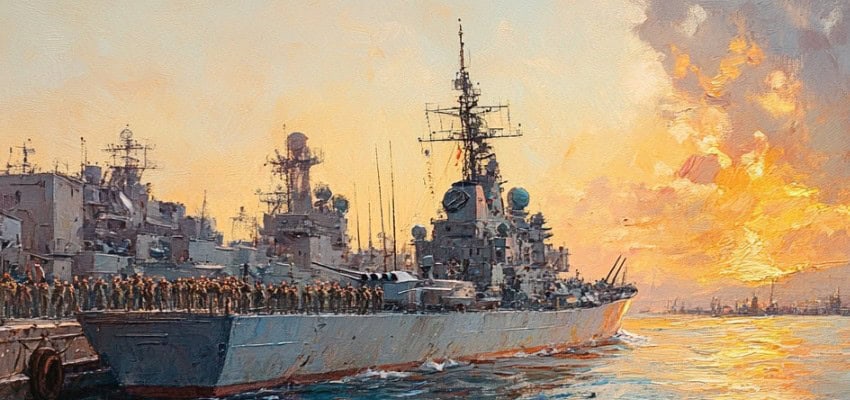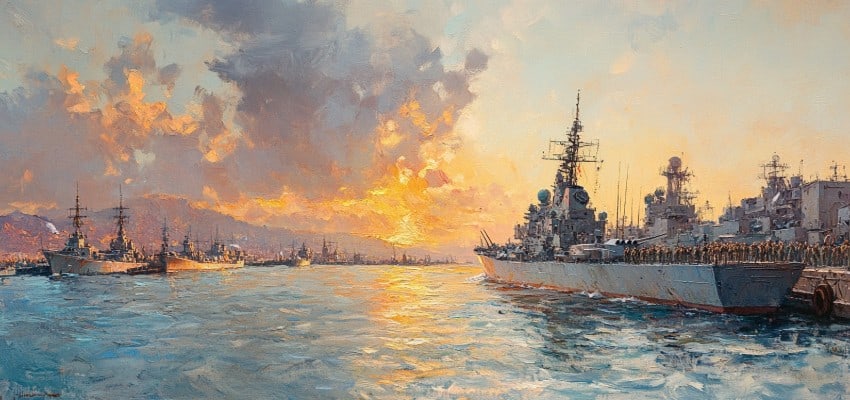Editor’s Note: This report provides a concise analysis of critical developments from December 12–14, 2024, covering Russia’s record-breaking missile strikes on Ukraine, the deployment of North Korean troops in Kursk Oblast, and Russia’s shifting military posture in Syria. By examining these interconnected events, the report sheds light on the strategic objectives driving Russia’s military actions, the effectiveness of Ukraine’s counteroffensive operations, and the broader geopolitical ramifications of ongoing conflicts. It also explores the role of Western military support and the tactical and operational adjustments being made on both sides of the conflict. This comprehensive assessment aims to equip readers with a nuanced understanding of the evolving dynamics of the war.
For those seeking to grasp the full scope of this evolving landscape, the complete updates from the Institute for the Study of War serve as an invaluable resource.
Content Assessment: Escalation in Ukraine -- Russia's Largest Missile Strikes, North Korean Troop Deployment, and Strategic Shifts in Syria
Information - 93%
Insight - 91%
Relevance - 91%
Objectivity - 94%
Authority - 95%
93%
Excellent
A short percentage-based assessment of the qualitative benefit expressed as a percentage of positive reception of the recent article from ComplexDiscovery OÜ titled, "Escalation in Ukraine: Russia's Largest Missile Strikes, North Korean Troop Deployment, and Strategic Shifts in Syria."
Background Note: ComplexDiscovery’s staff offers distinctive perspectives on the Russo-Ukrainian war and Middle Eastern conflicts, informed by military experience on the West German, East German, and Czechoslovakian border during the Cold War and in Sinai as part of Camp David Accord compliance activities. This firsthand regional knowledge has been further enhanced by recent staff travels to Eastern European countries, including Estonia, Finland, Latvia, Lithuania, and Poland. These visits have provided up-to-date, on-the-ground insights into the current geopolitical climate in regions directly impacted by the ongoing conflict.
Combined with cybersecurity, information governance, and eDiscovery proficiency, this multifaceted experience enables comprehensive analysis of these conflicts, including the critical impact of cyber warfare, disinformation, and digital forensics on modern military engagements. This unique background positions ComplexDiscovery to provide valuable insights for conflict-related investigations and litigation, where understanding the interplay of technology, data, and geopolitical factors is crucial.
Russo-Ukrainian Conflict Update*
Escalation in Ukraine: Russia’s Largest Missile Strikes, North Korean Troop Deployment, and Strategic Shifts in Syria
ComplexDiscovery Staff
The war in Ukraine and its global ripple effects have entered a critical phase, characterized by heightened military actions, evolving alliances, and geopolitical recalibrations. Between December 12 and 14, Russia escalated its campaign with its largest missile and drone strikes on Ukraine since the war began, targeting the nation’s critical infrastructure as part of a winter strategy designed to weaken morale and energy resilience. Simultaneously, reports emerged of North Korean troops joining Russian forces in Kursk Oblast, marking a notable shift in Russia’s reliance on unconventional allies.
Elsewhere, Russia’s military posture in Syria remains in flux, with significant withdrawals of personnel and equipment from key bases. Meanwhile, Western nations continue to bolster Ukraine’s capabilities with expedited military aid packages, highlighting the international dimensions of this ongoing conflict. These developments underscore the complexity of the war, where tactical maneuvers, strategic objectives, and global alliances intertwine to shape the battlefield and the broader geopolitical landscape.
Largest Russian Missile Campaign Against Ukraine
On December 12-13, Russia launched its largest coordinated missile and drone strikes against Ukraine since the start of the war. The operation involved 94 missiles and 193 drones, including advanced weapon systems like Kh-47M2 “Kinzhal” aeroballistic missiles and Kalibr cruise missiles. Ukrainian air defenses successfully intercepted 80 missiles and neutralized 185 drones through destruction or countermeasures.
The strikes targeted critical energy infrastructure across Ukraine, resulting in rolling blackouts and reduced output from five nuclear reactors. Kyiv, Odesa, Lviv, and other key regions suffered significant disruptions. The attacks are part of a deliberate Russian strategy to exploit winter conditions, weaken Ukraine’s resilience, and pressure Western nations into curbing their military aid and support for Kyiv.
Deployment of North Korean Troops in Kursk Oblast
On December 14, Ukrainian President Volodymyr Zelensky confirmed the deployment of North Korean troops in Kursk Oblast, marking a notable development in Russia’s international alliances. Zelensky stated that North Korean forces are integrated into Russian operations, conducting infantry assaults in offensive roles. Reports suggest that these troops have sustained significant casualties in combat.
Russian milbloggers corroborated these claims, noting that North Korean soldiers participated in the seizure of Plekhovo on December 6, with some asserting that the operation was carried out exclusively by North Korean forces. Ukrainian intelligence has indicated that the troops are deployed in groups of 20–30 for infantry assaults, often across open terrain, consistent with Russia’s highly attritional tactics.
The use of North Korean forces reflects Moscow’s growing reliance on unconventional allies to address its personnel shortages. However, the integration of these forces raises questions about their tactical effectiveness and potential strain on coordination between Russian and North Korean units.
Ukrainian Counterstrikes and Tactical Gains
Despite the intensity of Russia’s aerial campaign, Ukrainian forces continued to launch precision strikes on key Russian infrastructure. Ukrainian Special Operations Forces targeted the “Steel Horse” oil depot near Oryol City on December 13-14, disrupting a critical supply line for Russian military operations. This operation underscores Ukraine’s strategic focus on degrading Russia’s logistical capabilities deep within its territory.
Ukrainian counterstrikes on Russian airfields and air defense systems in rear areas are also yielding results. Data from the Ukrainian General Staff indicates a significant decrease in Russian glide bomb deployment in December, likely due to Ukrainian attacks on Russian air assets and defenses. The use of Western-provided ATACMS and Storm Shadow missiles has forced Russian aircraft to reposition further from the frontlines, reducing their operational reach.
Russian Redeployment and Strategic Challenges in Syria
Russia’s military presence in Syria continues to contract amid uncertainty over its future. Russian forces are withdrawing personnel and equipment from key bases, including Hmeimim Air Base and the Port of Tartus, while ongoing negotiations with Hayat Tahrir al-Sham (HTS) seek to secure temporary security guarantees for these locations. Satellite imagery from December 13 shows Russian military assets being prepared for transport, suggesting a phased redeployment of forward forces to the western coast of Syria.
The status of Russia’s Qamishli helicopter base in northeastern Syria remains unclear. Reports indicate that Russian personnel and equipment are still present, but conflicting accounts suggest a possible withdrawal may be imminent. The strategic redeployment reflects Moscow’s attempt to consolidate its presence while maintaining flexibility to reestablish control should more permanent agreements be reached with local authorities.
Western Support and Strategic Implications
In response to these developments, the United States announced a $500 million military aid package for Ukraine on December 12. This package includes critical capabilities such as HIMARS ammunition, counter-drone systems, and anti-tank weaponry, reflecting a commitment to sustaining Ukraine’s operational tempo. Reports suggest the Biden administration aims to accelerate deliveries before its term ends in January 2024.
The sustained flow of Western support enables Ukraine to maintain its strategic momentum, countering Russian advances and degrading Moscow’s capacity to sustain its war effort. The combined impact of precision strikes, international aid, and operational resilience underscores Ukraine’s ability to adapt to evolving challenges.
Strategic Personnel Shifts in Russia
Reports of personnel changes within the Russian military highlight the internal challenges facing Moscow. Major General Dmitry Ovcharov, commander of the 3rd Combined Arms Army, was reportedly dismissed following recent operational failures, including the abandonment of a T-90M tank in Ukrainian territory. This incident prompted a high-level inspection of Russia’s Southern Military District by Defense Minister Andrei Belousov.
At the same time, Russian President Vladimir Putin continues to bolster morale within key institutions, awarding Viktor Zolotov, head of the Rosgvardia, the Hero of Russia award. These measures reflect an effort to maintain cohesion and authority within the military and security apparatus.
Broader Implications
The deployment of North Korean troops in Kursk Oblast and Russia’s record-breaking missile strikes on Ukraine represent critical escalations in the conflict. These actions, combined with the redeployment of Russian forces in Syria, illustrate Moscow’s efforts to balance its global military commitments amid mounting pressure.
Meanwhile, Ukrainian counterstrikes and Western aid continue to erode Russia’s operational capabilities, challenging its ability to sustain the war. As the conflict enters a critical winter phase, the interplay of advanced weaponry, strategic redeployments, and shifting alliances will shape the next phase of this protracted conflict.
News Sources
As a leading source for cybersecurity, information governance, and legal discovery insights, including international investigations and litigation, ComplexDiscovery OÜ recognizes the importance of awareness regarding alleged and documented criminal acts, particularly in the context of the Russia-Ukraine conflict. While we, following the lead of the Institute for the Study of War (ISW), do not provide detailed coverage of war crimes in our primary reports, we encourage professionals within the eDiscovery ecosystem to stay informed about these activities. This awareness is crucial for understanding potential future legal actions and responsibilities.
Detailed Reporting with Maps for December 12-14, 2024, from the ISW – Mouseover to Scroll
Russo-Ukrainian War Update - December 14 2024Review the Detailed Reporting and Maps PDF
About the Institute for the Study of War Research Methodology
ISW’s research methodology relies on both primary and secondary sources, enabling researchers to develop a comprehensive understanding of the situation on the ground. In order to analyze military and political developments in any given area, ISW’s research analysts must wholly understand the systems of enemy and friendly forces. They must also understand the population demographics, physical terrain, politics, and history of that area. This lays the analytical foundation for understanding the reasons for particular developments and fulfilling their assigned research objectives. ISW analysts also spend time in places like Iraq, Afghanistan, and elsewhere in order to gain a better understanding of the security and political situation and to evaluate the implementation of current strategies and policies. Our researchers compile data and analyze trends, producing a granular analysis of developments in areas of research, producing an accurate, high-resolution, timely, and thorough picture of the situation. ISW’s research methodology guarantees its success and commitment to improving the nation’s ability to execute military operations, achieve strategic objectives, and respond to emerging problems that may require the use of American military power.
About the Institute for the Study of War
The Institute for the Study of War advances an informed understanding of military affairs through reliable research, trusted analysis, and innovative education. They are committed to improving the nation’s ability to execute military operations and respond to emerging threats in order to achieve U.S. strategic objectives. ISW is a non-partisan, non-profit, public policy research organization.
Learn more, get involved, and contribute today.
Additional Reading
- From Dissent to OSINT? Understanding, Influencing, and Protecting Roles, Reputation, and Revenue
- [Annual Update] International Cyber Law in Practice: Interactive Toolkit
- Data Embassies: Sovereignty, Security, and Continuity for Nation-States
Assisted by GAI and LLM Technologies
* Sourced and shared with direct express permission from the Institute for the Study of War (ISW).
Source: ComplexDiscovery OÜ























